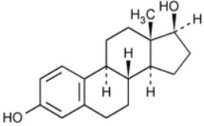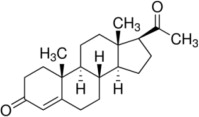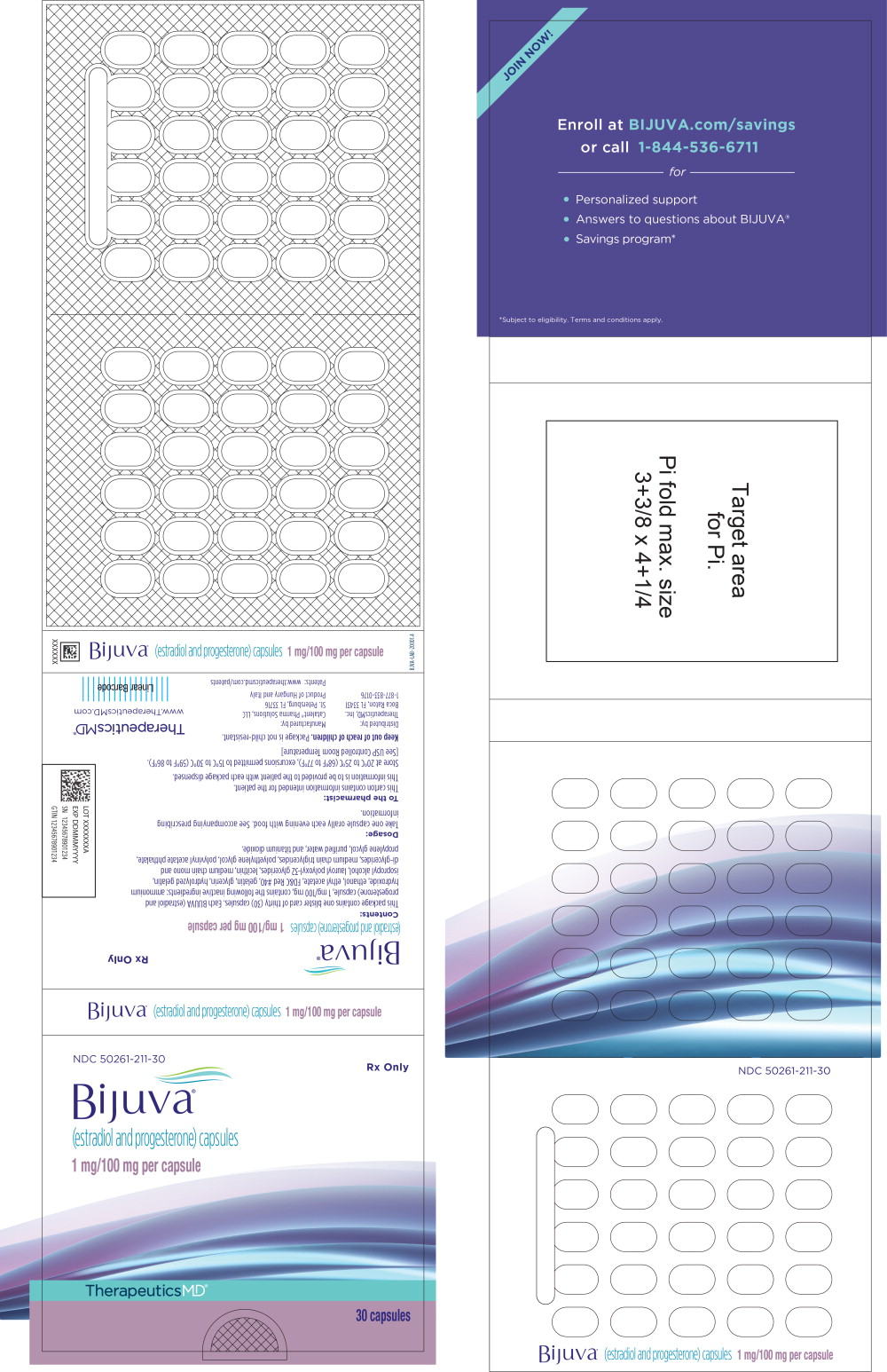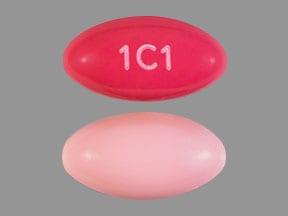Bijuva
Generic name: estradiol and progesterone
Drug class: Sex hormone combinations
Medically reviewed by A Ras MD.
What is Bijuva?
Bijuva is a prescription medicine that contains two kinds of hormones, an estrogen and progesterone.
Bijuva is used after menopause to reduce moderate to severe hot flashes.
Estrogens are hormones made by a woman’s ovaries. The ovaries normally stop making estrogens when a woman is between 45 and 55 years old. This drop in body estrogen levels causes the “change of life” or menopause (the end of monthly menstrual periods). Sometimes, both ovaries are removed during an operation before natural menopause takes place. The sudden drop in estrogen levels causes “surgical menopause.”
When estrogen levels begin dropping, some women get very uncomfortable symptoms, such as feelings of warmth in the face, neck, and chest, or sudden strong feelings of heat and sweating (“hot flashes” or “hot flushes”). In some women the symptoms are mild, and they will not need to take estrogens. In other women, symptoms can be more severe.
Description
BIJUVA (estradiol and progesterone) is an oval shaped opaque capsule in which the estradiol is solubilized and the progesterone is micronized and suspended in the mixture of medium chain mono and di-glycerides and lauroyl polyoxyl-32 glycerides. Each capsule is light pink on one side, dark pink on the other side, and printed with “1C1” in white ink.
Estradiol (estra-1,3,5 (10)-triene-3,17β-diol), an estrogen, has a molecular weight of 272.38, and chemical formula C18H24O2.
Progesterone (pregn-4-ene-3, 20-dione) has a molecular weight of 314.47, and chemical formula C21H30O2.
The structural formulas are as follows:
 |
Estradiol |
 |
Progesterone |
Each BIJUVA (estradiol and progesterone) capsule, 1 mg/100 mg, contains the following inactive ingredients: ammonium hydroxide, ethanol, ethyl acetate, FD&C Red #40, gelatin, glycerin, hydrolyzed gelatin, isopropyl alcohol, lauroyl polyoxyl-32 glycerides, lecithin, medium chain mono and di-glycerides, medium chain triglycerides, polyethylene glycol, polyvinyl acetate phthalate, propylene glycol, purified water, and titanium dioxide.
Mechanism of Action
Endogenous estrogens are largely responsible for the development and maintenance of the female reproductive system and secondary sexual characteristics. Although circulating estrogens exist in a dynamic equilibrium of metabolic interconversions, estradiol is the principal intracellular human estrogen and is substantially more potent than its metabolites, estrone and estriol, at the receptor level.
The primary source of estrogen in normally cycling adult women is the ovarian follicle, which secretes 70 to 500 mcg of estradiol daily, depending on the phase of the menstrual cycle. After menopause, most endogenous estrogen is produced by conversion of androstenedione, secreted by the adrenal cortex, to estrone in the peripheral tissues. Thus, estrone and the sulfate conjugated form, estrone sulfate, are the most abundant circulating estrogens in postmenopausal women.
Estrogens act through binding to nuclear receptors in estrogen-responsive tissues. To date, two estrogen receptors have been identified. These vary in proportion from tissue to tissue.
Circulating estrogens modulate the pituitary secretion of the gonadotropins, luteinizing hormone (LH), and FSH, through a negative feedback mechanism. Estrogens act to reduce the elevated levels of these hormones seen in postmenopausal women.
Endogenous progesterone is secreted by the ovary, placenta, and adrenal gland. In the presence of adequate estrogen, progesterone transforms a proliferative endometrium into a secretory endometrium.
Progesterone enhances cellular differentiation and generally opposes the actions of estrogens by decreasing estrogen receptor levels, increasing local metabolism of estrogens to less active metabolites, or inducing gene products that blunt cellular responses to estrogen. Progesterone exerts its effects in target cells by binding to specific progesterone receptors that interact with progesterone response elements in target genes. Progesterone receptors have been identified in the female reproductive tract, breast, pituitary, hypothalamus, and central nervous system.
What is the most important information I should know about Bijuva?
- Do not use estrogens with or without progestogens to prevent heart disease, heart attacks, strokes, or dementia (decline of brain function).
- Taking estrogens with progestogens may increase your chances of getting heart attacks, strokes, breast cancer, or blood clots.
- Taking estrogens with progestogens may increase your chance of getting dementia, based on a study of women 65 years of age or older.
- Taking estrogen-alone may increase your chance of getting cancer of the uterus.
- Taking estrogen-alone may increase your chances of getting strokes or blood clots.
- Taking estrogen-alone may increase your chance of getting dementia, based on a study of women 65 years of age or older.
- You and your healthcare provider should talk regularly about whether you still need treatment with Bijuva.
Who should not take Bijuva?
Do not take Bijuva if you have had your uterus (womb) removed (hysterectomy).
Bijuva contains progesterone to decrease the chance of getting cancer of the uterus. If you do not have a uterus, you do not need progesterone and you should not take Bijuva.
Do not take Bijuva if you:
- have any unusual vaginal bleeding.Vaginal bleeding after menopause may be a warning sign of cancer of the uterus (womb). Your healthcare provider should check any unusual vaginal bleeding to find out the cause.
- currently have or have had certain cancers.Estrogens may increase the chances of getting certain types of cancers, including cancer of the breast or uterus. If you have or have had cancer, talk with your healthcare provider about whether you should take Bijuva.
- currently have or have had blood clots.
- had a stroke or heart attack.
- currently have or have had liver problems.
- have been diagnosed with a bleeding disorder.
- are allergic to Bijuva or any of its ingredients. See the list of ingredients in Bijuva at the end of this leaflet
What should I tell my healthcare provider before taking Bijuva?
Before you take Bijuva, tell your healthcare provider about all of your medical conditions, including if you:
- have high levels of fat in your blood (triglycerides).
- have any unusual vaginal bleeding. Vaginal bleeding after menopause may be a warning sign of cancer of the uterus (womb). Your healthcare provider should check any unusual vaginal bleeding to find out the cause.
- have certain medical conditions that may become worse while you are taking Bijuva. Your healthcare provider may need to check you more carefully if you have certain conditions, such as:
- asthma (wheezing)
- diabetes
- a genetic problem called porphyria
- lupus
- hypertension (high blood pressure)
- have high calcium in your blood
- epilepsy (seizures)
- migraine
- endometriosis
- angioedema (swelling of face or tongue)
- problems with your heart, liver, thyroid or kidneys
- are going to have surgery or will be on bed rest. Your healthcare provider will let you know if you need to stop taking Bijuva.
- are pregnant or think you may be pregnant. Bijuva is not for pregnant women.
- are breastfeeding. The hormones in Bijuva can pass into your breast milk.
Tell your healthcare provider about all the medicines you take, including prescription and over-the-counter medicines, vitamins, and herbal supplements. Some medicines may affect how Bijuva works. Some other medicines and food products may increase or decrease the concentrations of the hormones in Bijuva in the blood. Bijuva may affect how your other medicines work, and other medicines may affect how Bijuva works.
How should I take Bijuva?
- Take Bijuva exactly as your healthcare provider tells you to take it.
- Take 1 capsule by mouth each evening with food.
- If you miss a dose of Bijuva, take the missed dose as soon as possible with food, unless it is within two hours of the next evening dose of Bijuva.
- Estrogens should be used at the lowest dose possible for your treatment and only as long as needed. You and your healthcare provider should talk regularly (for example, every 3 to 6 months) about whether you still need treatment with Bijuva.
What are the possible side effects of Bijuva?
Side effects are grouped by how serious they are and how often they happen when you are treated.
Serious but less common side effects include:
- heart attack
- stroke
- blood clots
- breast cancer
- cancer of the lining of the uterus (womb)
- cancer of the ovary
- dementia
- gallbladder disease
- high or low blood calcium levels
- changes in vision
- high blood pressure
- high levels of fat in your blood (triglycerides)
- liver problems
- changes in thyroid hormone levels
- swelling or fluid retention
- enlargement of benign tumors of the uterus (“fibroids”)
- worsening swelling of face or tongue (angioedema) in women who have a history of angioedema
- changes in laboratory test results such as bleeding time and high blood sugar levels
Call your healthcare provider right away if you get any of the following warning signs or any other unusual symptoms that concern you:
- new breast lumps
- unusual vaginal bleeding
- changes in vision or speech
- sudden new severe headaches
- severe pains in your chest or legs with or without shortness of breath, weakness and fatigue
- vomiting
The most common side effects of Bijuva include:
- breast tenderness
- headache
- vaginal bleeding
- vaginal discharge
- pelvic pain
Tell your healthcare provider if you have any side effect that bothers you or that does not go away.
These are not all of the possible side effects of Bijuva. Call your doctor for medical advice about side effects. You may report side effects to FDA at 1-800-FDA-1088.
You may also report side effects to TherapeuticsMD at 1-888-228-0150.
What can I do to lower my chances of a serious side effect with Bijuva?
- Talk with your healthcare provider regularly about whether you should continue taking Bijuva.
- If you have a uterus, talk with your healthcare provider about whether the addition of a progestogen is right for you.
- The addition of a progestogen is generally recommended for a woman with a uterus to reduce the chance of getting cancer of the uterus (womb).
- See your healthcare provider right away if you get vaginal bleeding while taking Bijuva.
- Have a pelvic exam, breast exam and mammogram (breast X-ray) every year unless your healthcare provider tells you something else.
- If members of your family have had breast cancer or if you have ever had breast lumps or an abnormal mammogram (breast X-ray), you may need to have breast exams more often.
- If you have high blood pressure, high cholesterol (fat in the blood), diabetes, are overweight, or if you use tobacco, you may have higher chances for getting heart disease.
Ask your healthcare provider for ways to lower your chances for getting heart disease.
General information about the safe and effective use of Bijuva
Medicines are sometimes prescribed for purposes other than those listed in a Patient Information leaflet. Do not use Bijuva for a condition for which it was not prescribed. Do not give Bijuva to other people, even if they have the same symptoms that you have. It may harm them. You can ask your pharmacist or healthcare provider for information about Bijuva that is written for health professionals.
How should I store Bijuva?
- Store at room temperature between 68°F to 77°F (20°C to 25ºC).
- Keep Bijuva and all medicines out of the reach of children.
What are the ingredients in Bijuva?
Active ingredients: estradiol and progesterone.
Inactive ingredients: ammonium hydroxide, ethanol, ethyl acetate, FD&C Red #40, gelatin, glycerin, hydrolyzed gelatin, isopropyl alcohol, lauroyl polyoxyl-32 glycerides, lecithin, medium chain mono and di-glycerides, medium chain triglycerides, polyethylene glycol, polyvinyl acetate phthalate, propylene glycol, purified water, and titanium dioxide.
Label
Principal Display Panel – 1 mg Carton Label
- NDC 50261-211-30
- Rx Only
- Bijuva®
- (estradiol and progesterone) capsules
- 1 mg/100 mg per capsule
- TherapeuticsMD®
- 30 capsules


SRC: NLM .
